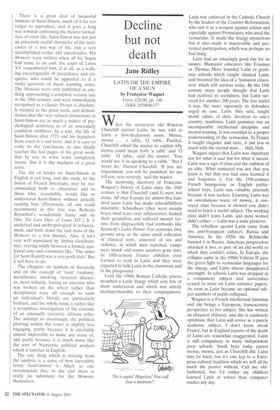Decline but not death
Jane Ridley
LATIN OR THE EMPIRE OF A SIGN by Francoise Waquet Verso, 120.00, pp. 346 ISBN 1859846157 When the seven-year old Winston Churchill started Latin, he was told to learn a first-declension noun. Mensa, mensa ... a table, 0 table. Puzzled, Churchill asked the master to explain why mensa could mean both 'a table' and '0 table'. '0 table,' said the master. 'You would use it in speaking to a table.' But I never do,' blurted Churchill. 'If you are impertinent, you will be punished, let me tell you, very severely,' said the master.
The surprising discovery of Francoise Waquet's history of Latin since the 16th century is that Churchill (and I) were not alone. All over Europe for almost five hundred years Latin has made schoolchildren miserable. Schoolboys (they were mainly boys) shed tears over subjunctives, funked their gerundives and suffered mental torture from disgracefully had textbooks like Kennedy's Latin Primer. For centuries they ground away at the same small collection of classical texts, censored of sex and violence, in which men marched, camps were struck and winter quarters gone into. In 18th-century France children even learned to read in Latin and they were expected to talk Latin in the classroom and in the playground.
Until the 1960s Roman Catholic priests mouthed a Latin liturgy which very few of them understood and which was utterly incomprehensible to their congregations.
Latin was enforced in the Catholic Church by the leaders of the Counter-Reformation, who saw it as a weapon against schism and especially against Protestants, who used the vernacular. It made the liturgy mysterious but it also made it inaccessible and prevented participation, which was perhaps no bad thing.
Latin had an amazingly good run for its money. Humanist educators like Erasmus or Thomas More founded Latin or grammar schools which taught classical Latin, and invented the idea of a 'humanist education' which still survives today. By the 18th century many people thought that Latin had outlived its usefulness, but Latin survived for another 200 years. The less useful it was, the more vigorously its defenders urged its case. Latin, they said, taught moral values of duty, devotion to one's country, manliness. Latin grammar was an incomparable intellectual discipline and mental training. It was essential to a proper understanding of the vernacular. In France it taught elegance and taste, it put you in touch with the eternal man ... blah, blah.
Waquet argues that Latin was important not for what it said but for what it meant. Latin was a sign of class and the emblem of an elite. What mattered was not that you knew it, but that you had once learned it and forgotten it. For the 19th-century French bourgeoisie or English publicschool boys. Latin was valuable precisely because it was useless. Learning Latin was an ostentatious waste of money, it conveyed class because it showed you didn't need to learn a useful subject. The working class didn't learn Latin, and most women didn't either — Latin was a male preserve.
The rebellion against Latin came from two anti-European cultures: Russia and America. In the 1920s the Bolsheviks banned it in Russia. American progressives attacked it too, as part of an old world to which they couldn't relate. In Europe, the collapse came in the 1960s.Vatican II gave the green light to vernacular languages for the liturgy, and Latin almost disappeared overnight. In schools Latin was dropped as a compulsory subject and universities ceased to insist on Latin entrance papers. As soon as Latin became an optional subject numbers of pupils collapsed.
Waquet is a French intellectual historian and she brings a European, francocentric perspective to her subject. She has written an eloquent obituary, and she is cautiously optimistic that Latin will revive as a purely academic subject. I don't know about France, but in England reports of the death of Latin are somewhat exaggerated. Latin is still compulsory in many independent prep schools. Small boys today parrot mensa, mensa, just as Churchill did. Latin may be hard, but it's one key to a European cultural tradition which we will all be much the poorer without. Call me oldfashioned, but I'd rather my children learned Latin at school than computer studies any day.


























































 Previous page
Previous page